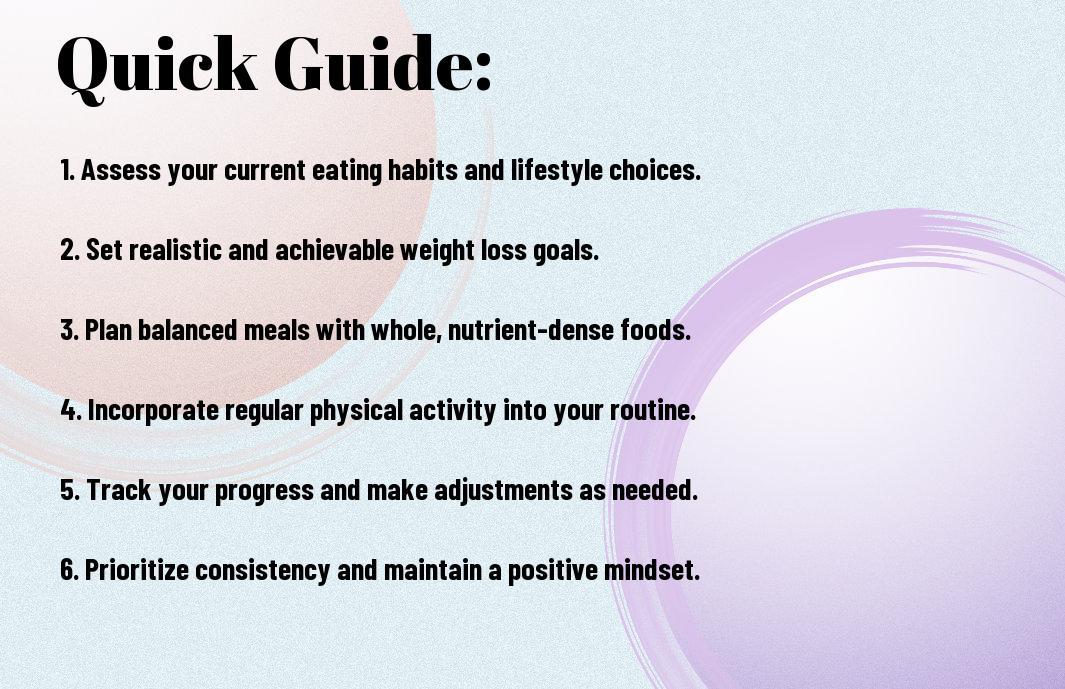Over the years, countless diets have come and gone, but the key to lasting weight loss lies in creating a plan that fits seamlessly into your lifestyle. In this guide, you will learn how to develop a sustainable weight loss strategy that not only helps you shed pounds but also promotes long-term health and well-being. By focusing on realistic goals, balanced nutrition, and consistent movement, you can cultivate habits that will support your journey for a lifetime. Let’s commence on this transformative journey together, empowering you to take control of your health with confidence.
Key Takeaways:
- Set Realistic Goals: Establish achievable weight loss targets that promote long-term success.
- Focus on Nutrition: Prioritize a balanced diet rich in whole foods, including fruits, vegetables, lean proteins, and whole grains.
- Incorporate Physical Activity: Engage in regular exercise that you enjoy, making it a consistent part of your routine.
- Practice Mindful Eating: Develop awareness of your eating habits to enhance your relationship with food and prevent overeating.
- Track Progress: Keep a record of your weight loss journey, adjusting your plan as needed to stay motivated and accountable.


Understanding Sustainable Weight Loss
Your approach to weight loss should focus on sustainability rather than quick fixes. Sustainable weight loss means adopting healthy habits that support your overall well-being in the long run. This involves creating a lifestyle that promotes gradual weight loss, helps maintain your goal weight, and fosters positive relationships with food and exercise.
Types of Weight Loss Plans
Your journey toward weight loss can take many forms, from low-carb diets to calorie counting. (The important decision lies in choosing a plan that fits your lifestyle and preferences.)
- Low-Carbohydrate Diets
- Intermittent Fasting
- Mediterranean Diet
- Whole Foods Approach
- This plan should be personalized for effective results.
| Weight Loss Plan | Description |
|---|---|
| Low-Carbohydrate Diet | Focuses on reducing carbs to promote fat burning. |
| Intermittent Fasting | Cycling between eating and fasting periods. |
| Mediterranean Diet | Emphasizes fruits, vegetables, whole grains, and healthy fats. |
| Whole Foods Approach | Prioritizes unprocessed and natural foods. |
| Caloric Deficit | Involves consuming fewer calories than expended to lose weight. |
Factors Influencing Weight Loss Success
Factors that affect your weight loss success include your metabolism, activity level, and emotional well-being. These aspects play a significant role in determining how effectively you can achieve and maintain your weight goals.
- Understanding your body’s metabolism
- Incorporating regular physical activity
- Managing stress and emotional health
- Establishing realistic and achievable goals
- Assume that making gradual changes leads to lasting success.
Success in weight loss is often determined by multiple elements working in tandem. Your mindset, dietary choices, exercise routines, and support systems significantly contribute to your journey. Ensuring you address these can enhance your ability to lose weight sustainably.
- Setting achievable goals you can stick to
- Tracking your progress over time
- Maintaining a balanced and nutritious diet
- Finding a support network to stay motivated
- Assume that an holistic approach will lead to longer-lasting results.
Step-by-Step Guide to Creating Your Plan
While launching on your weight loss journey, developing a structured plan is necessary to ensure lasting results. Begin by breaking down your goals into manageable steps that encompass lifestyle changes, nutrition, and physical activity. The table below offers a clear overview of how to effectively create your sustainable weight loss plan.
Steps to Create Your Weight Loss Plan
| Step 1: Assess Your Current Lifestyle | Identify habits and routines that influence your weight. |
| Step 2: Set Realistic Goals | Establish achievable objectives that align with your lifestyle. |
| Step 3: Monitor Progress | Regularly check in on your goals and adjust as necessary. |
| Step 4: Seek Support | Find friends, family, or professionals to help you stay accountable. |
Assessing Your Current Lifestyle
Assuming you want to transform your weight loss journey, evaluating your current habits is the first step. Take note of your daily routines, including your eating patterns, activity levels, and overall lifestyle. Understanding these factors will provide a baseline for where you are and highlight areas for improvement.
Setting Realistic Goals
Assessing your habits will help you set goals that fit your situation. Avoid harsh measures or unrealistic dreams; instead, focus on what you can reasonably achieve given your lifestyle and commitments. Think in small, incremental changes rather than drastic shifts.
Plus, when you set realistic goals, you’re more likely to maintain motivation and see progress. Instead of aiming to lose a large amount of weight quickly, focus on losing 1-2 pounds per week. This approach not only makes your target more attainable but also promotes sustainable practices that ensure long-term success without overwhelming yourself.
Tips for Maintaining Your Weight Loss
Keep your new habits active with these simple tips:
- Prioritize a balanced diet that you enjoy.
- Set realistic goals to prevent burnout.
- Track your progress to stay motivated.
- Stay connected with supportive communities.
- Keep a regular routine for meals and exercise.
Thou must commit to long-term changes for sustainable results.
Incorporating Healthy Eating Habits
Assuming you incorporate healthy eating habits, focus on whole foods that fuel your body. Opt for fruits, vegetables, whole grains, and lean proteins to create a nutrition plan that promotes satisfaction and vitality. Establish a meal prep routine to ensure healthy choices are always available, making it easier to stick to your goals.
Importance of Regular Exercise
There’s no denying that regular exercise plays a significant role in maintaining weight loss. Engaging in consistent physical activity not only helps burn calories but also boosts your metabolism. (Deciding to include varied workouts can keep your routines exciting.) Prioritize activities you enjoy, whether it’s dancing, running, or yoga, as this will support long-term sustainability.
To build upon the importance of regular exercise, it promotes mental well-being and improves your mood. Incorporating workouts you find enjoyable can transform your fitness journey into a pleasurable experience. (Making time for exercise should be a non-negotiable part of your daily routine for optimal health.)
Pros and Cons of Various Weight Loss Methods
Now, it’s imperative to weigh the pros and cons of various weight loss methods to choose the right one for you. Below is a summary of key points to consider.
| Weight Loss Method | Pros | Cons |
|---|---|---|
| The ketogenic diet | Rapid weight loss, reduced hunger | Difficult to maintain long-term, potential nutrient deficiencies |
| Intermittent fasting | Simplicity, improved metabolic health | May lead to binge eating, not suitable for everyone |
| Low-calorie diets | Effective for quick weight loss | Risk of muscle loss, nutritional gaps |
| Plant-based diets | Improved health markers, ethical benefits | Potential protein deficiency, requires careful planning |
| Weight Watchers | Community support, flexible eating | Cost can be a barrier, may lead to obsessive tracking |
| Commercial meal replacements | Convenience, structured plan | Limited food variety, may feel unsustainable |
| Running or aerobics | Boosts cardio fitness, easy to start | Risk of injury, time-consuming |
| Strength training | Promotes muscle growth, enhances metabolism | Requires gym access or equipment, learning curve |
| Mindful eating | Improves relationship with food, promotes awareness | Progress may be slow, requires consistent practice |
Popular Diets and Their Effectiveness
Cons of popular diets often include restrictive eating patterns that may lead to yo-yo dieting. Different diets yield varying results, so choose one in line with your lifestyle and preferences (a long-term focus is key to effective weight management).
Evaluating Long-term Sustainability
Sustainability in weight loss methods is vital to your long-term success and health. Assess whether a chosen plan fits seamlessly into your daily life, as extreme measures often lead to burnout (you should prioritize plans that promote balanced habits).
Sustainability is not only about how quickly you lose weight but also about maintaining that loss over time. A sustainable plan should incorporate enjoyable foods, physical activity you love, and strategies to manage stress and social situations (the goal is to create a healthy lifestyle, not just a temporary fix).
Weight loss should focus on making informed, balanced decisions that support your overall well-being and happiness, rather than quick fixes or trends that compromise your health.
Staying Motivated Throughout Your Journey
Once again, motivation is key to maintaining your weight loss plan long-term. It’s easy to feel discouraged during tough times, but surrounding yourself with positive influences can help you push through. Regularly revisit your goals and celebrate small victories along the way to keep your spirits high.
Building a Support System
Staying connected with people who share your goals can enhance your motivation. (Choose friends or groups that uplift you rather than bring you down.) Engage in discussions, share experiences, and hold each other accountable, fostering a supportive environment that helps you stay focused on your journey.
Tracking Your Progress
On your weight loss journey, tracking your progress is important to stay motivated and adjust your approach as needed. Use tools like journals, apps, or charts to monitor your achievements, workouts, and nutrition. By regularly assessing your progress, you can identify patterns, celebrate milestones, and find areas for improvement.
Your progress tracking should evolve as you do. Consider setting different goals beyond just weight loss, such as improved fitness levels or healthier eating habits. This way, you keep your focus on overall wellness, empowering yourself to make positive changes for the long term and ensuring that your journey towards sustainability continues.
Common Challenges and How to Overcome Them
Unlike quick-fix diets, a sustainable weight loss plan faces unique challenges that can hinder your progress. Strategies to overcome these hurdles involve adjusting your mindset and developing practical solutions. By acknowledging these barriers and applying effective techniques, you can maintain your commitment to long-term health and well-being.
Dealing with Plateaus
Some plateaus are a normal part of your weight loss journey that can be frustrating. (An important decision is to reassess your strategies and make necessary adjustments.) Consider modifying your workout routine or calorie intake to reignite progress and keep you on track.
Managing Cravings and Emotional Eating
You often face cravings and emotional eating triggers that can derail your efforts. (An important decision here involves identifying your triggers and developing healthier coping mechanisms.) Establishing a plan to deal with these situations can help you stay focused on your goals and maintain progress.
Cravings can arise from various factors, including stress, boredom, or specific food triggers. To manage them effectively, focus on incorporating healthier alternatives and mindful eating practices into your routine. (An important decision is to practice self-compassion when dealing with setbacks.) By addressing emotional eating patterns and establishing a clear awareness of your cravings, you can cultivate a healthier relationship with food, ensuring lasting success on your weight loss journey.
Conclusion
Drawing together the importants of creating a sustainable weight loss plan that works for life, it is vital that you focus on balanced nutrition, regular physical activity, and mindset shifts that support long-term habits. Tailor your approach based on your unique preferences and lifestyle while setting achievable goals that keep you motivated. By prioritizing consistency over perfection and allowing for flexibility, you can cultivate a healthier relationship with food and exercise, ultimately leading to lasting success in your weight loss journey.
Q: What are the key components of a sustainable weight loss plan?
A: A sustainable weight loss plan should focus on several key components: balanced nutrition, regular physical activity, and behavioral changes. Start by incorporating a variety of whole foods into your diet, including fruits, vegetables, whole grains, lean proteins, and healthy fats. Set achievable exercise goals that you enjoy, such as walking, cycling, or dancing, to ensure consistency. Finally, work on developing positive habits by monitoring your progress, setting realistic goals, and staying mindful of your eating behaviors. This comprehensive approach will help create lasting changes to your lifestyle.
Q: How can I overcome obstacles and stay motivated during my weight loss journey?
A: Overcoming obstacles and maintaining motivation can be challenging, but with the right strategies, it’s possible. First, establish a support system by involving friends, family, or a weight loss group to share experiences and encouragement. Set short-term goals that lead to long-term success to keep your motivation high; celebrating small victories can reinforce positive behavior changes. Additionally, create a flexible plan that allows for occasional indulgences without guilt, helping you navigate social situations and prevent feelings of deprivation. Regularly reassess your goals and progress to keep the journey exciting and relevant to your lifestyle.
Q: How do I ensure my weight loss plan is adaptable for the long term?
A: To create an adaptable weight loss plan that lasts, focus on developing habits that can fit into your lifestyle over time. Start by identifying your personal preferences regarding foods and activities, as this increases the likelihood of adherence. Incorporate variety into your meals and workouts to prevent boredom and encourage exploration of new healthy options. Regularly revisiting and adjusting your goals will help maintain your interest and accommodate life changes, such as shifts in schedule or personal circumstances. Emphasizing balance and moderation instead of strict restrictions allows you to maintain your weight loss achievements while enjoying a diverse range of foods and activities.










Reply